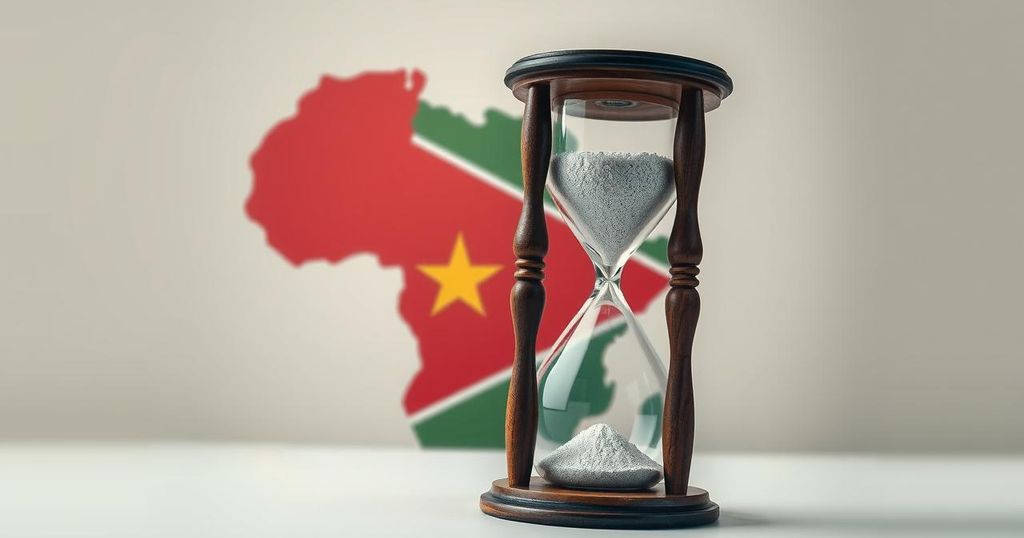The article outlines the urgent need for South Sudan to fulfill commitments under the 2018 peace accord as it begins an extended transitional period. Despite some progress, significant challenges remain regarding electoral preparations amid a worsening humanitarian crisis and escalating insecurity. The UN emphasizes the importance of immediate action from South Sudanese leaders to achieve progress before the upcoming elections in December 2026.
As South Sudan commences its “extended transitional period” this month, the United Nations’ foremost envoy has cautioned that urgent action is required to fulfill commitments outlined in the significant 2018 peace accord, ahead of the newly established deadline of February 2027. Originally created to terminate prolonged conflict, the Revitalized Peace Agreement set a three-year timeframe for elections and the establishment of a democratic government, which has since been prolonged four times due to unaddressed key political and security issues.
According to the latest extension revealed by authorities last September, general elections are now slated for December 2026. Speaking to ambassadors at the Security Council, Mr. Nicolas Haysom, the Special Representative of the Secretary-General for South Sudan, highlighted that while citizens have demonstrated considerable patience, they expect tangible progress on the peace agreement’s stipulations. “There is a strong desire for the leaders to focus on the benchmarks set out in the peace agreement – without further delay,” he asserted.
Despite some progress, South Sudan continues to face significant challenges, particularly concerning the approaching elections. Although a security sector management framework and a national violence reduction strategy have been established, fundamental requirements—such as the deployment of unified security forces and voter education—remain unmet. “We have not yet seen the previously promised harmonized workplan with an operational timetable for elections,” Mr. Haysom remarked, noting that delays in governmental funding further hinder advancement.
Widespread communal violence exacerbates insecurity, adversely impacting vulnerable groups, particularly women and children. Recent confrontations among armed factions in Western Equatoria, coupled with numerous illegal checkpoints, emphasize the precarious security situation. Additionally, the ongoing conflict in neighboring Sudan has destabilized parts of South Sudan, resulting in unrest following the execution of nationals in Wad Madani.
The humanitarian crisis is dire, with over one million Sudanese refugees residing in South Sudan and approximately 9.3 million locals requiring urgent assistance. The economic climate is deteriorating, with inflation rates soaring to 107 percent and food costs doubling, while government staff have gone unpaid for ten months. Health conditions have worsened, exemplified by over 23,000 cholera cases that have spread due to last year’s floods.
The 2025 Humanitarian Needs and Response Plan aims to provide life-saving assistance to 5.4 million individuals, yet funding shortfalls remain a critical concern. The UN is seeking $1.7 billion this year to address these pressing needs. Furthermore, Mr. Haysom discussed the operational difficulties faced by the UN peacekeeping mission, UNMISS, following a government request for the mission to vacate sections of its headquarters within a tight deadline, which he called a significant burden.
In closing, Mr. Haysom reaffirmed the UN’s unwavering commitment to support the people of South Sudan in their journey towards stabilization and democratization, emphasizing the necessity for prompt action by leadership.
The article discusses the current political and humanitarian situation in South Sudan as it enters an extended transitional period following the Revitalized Peace Agreement of 2018. This agreement aimed to end prolonged conflict and establish a democratic government. The article highlights the ongoing challenges, including the need for timely elections and the pressing humanitarian crisis affecting millions of people in the region, compounded by economic instability and health issues.
In summary, South Sudan faces critical challenges as it navigates its extended transitional period under the 2018 peace agreement. With impending elections and deepening humanitarian crises, urgent actions are required from leadership to fulfill key commitments and improve the situation for its citizens. Continued support from the United Nations and international community remains essential as the country strives toward stabilization and democratic governance.
Original Source: www.miragenews.com






